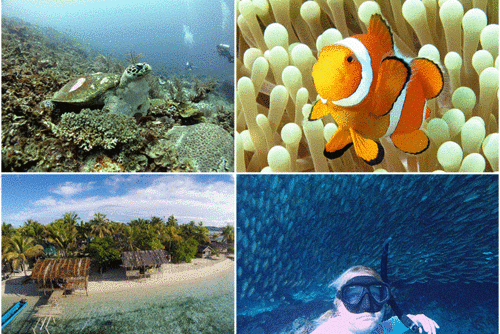The Raja Ampat PADI Diving Project focuses on both marine conservation and community initiatives in one of the most stunning, aquatic environments on earth. The project is located at the heart of the Coral Triangle in an archipelago known as Raja Ampat. Situated off the coast of Western Papua in the east of Indonesia, this truly is a diving paradise and an epicentre of marine biodiversity.
Understanding that the long-term protection of this special environment cannot work unless accompanied by education and the sustained alleviation of poverty, the project works with the local communities - educating, improving quality of life and aiming to alleviate poverty. There are a number of community projects and initiatives for volunteers to get involved with around the twice-daily dives, which makes for a truly rewarding marine conservation volunteer experience.
Itinerary
Day 1
Transfer to the ferry port (opposite the Meridian Hotel) from your hotel and catch a boat to the project site on Arborek Island. Spend the rest of the day settling in, exploring the project site and meeting your fellow volunteers. This is the perfect time in which to take in the beauty of Raja Ampat - one of the most pristine marine environments anywhere on earth!
Day 2-7
A typical week day on the project consists of two survey-dives and time spent on one or more of the numerous community projects within the local area. Depending on the weather conditions, volunteers either start the first survey dive at 9am or visit the local community to assist on a community project. After lunch, volunteers will complete another survey-dive. Saturdays are reserved for leisure dives in the morning and free afternoons with Sunday being a complete no dive day to allow recovery time. This time can be spent sunbathing, playing beach volleyball or football, swimming, snorkelling, exploring the island, visiting the local village. If you are unqualified, you will complete your PADI Open Water and Advanced Open Water qualifications this week
Day 8-21
From this week you will continue your survey dives and time spent on various community projects. As a PADI Advanced Open Water Qualified diver, you will have the opportunity to complete your Emergency First Response and Rescue Diver qualifications (at an additional cost)
Day 22
Unfortunately today is your last day and you will transfer back to Sorong for one final night before catching your return flight home or for the commencement of independent travel plans.
Project Activities
On this project you will get the chance to take part in a wide variety of exciting activities. Below are examples of some of those included in this project.
Coral reef conservation and monitoring
This will be conducted via two research-dives a day from Monday to Friday. The main purpose of this is to produce detailed coastal habitat maps of the surrounding area for use in advising local government and communities on Marine Protected Areas.
Working within local communities
Marine conservation volunteers may be involved with teaching English to the school children and other community members. They may also be involved in a range of other activities including climate change research, livelihood diversification workshops, working within a community medical clinic and providing education on environmental issues and eco-tourism.
Beach Clean-Ups
This is an essential part of the work here as it ensures that the marine environment stays in as pristine condition as possible. Encourage entrepreneurial attitudes The ultimate aim of this being to deter local communities from unsustainable destructive activities like shark finning or dynamite fishing.
Manta ray monitory programme
Volunteers wishing to participate in the manta ray monitory programme are trained to recognize key characteristics, markings and behaviours of these gentle giants, as well as their ecology, biology and conservation. Remember however that manta ray sightings cannot be guaranteed!
Scuba Diving
This can not only be done during the daily survey dives but also during your free time. The marine life here is second to none and therefore it is essential for you to get under water as much as possible!



